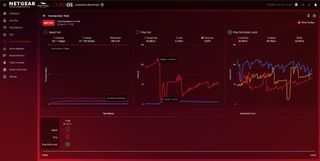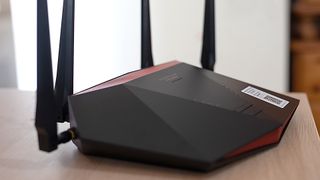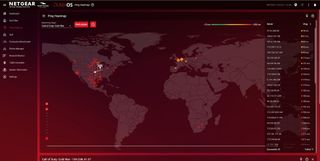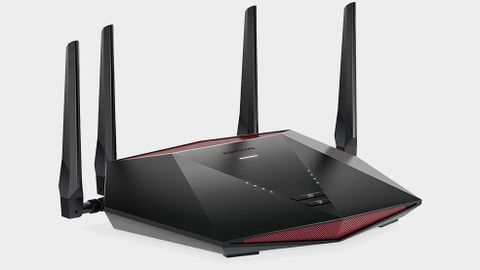Our Verdict
An excellent choice for Wi-Fi enthusiasts, but lacks support for a really fast wired network.
For
- Screaming fast Wi-Fi 6
- OS has plenty of options
Against
- Disappointing selection of ports
- Can be sluggish in operation
- Pricey security package
PC Gamer's got your back
The Nighthawk XR1000 is the latest router from networking powerhouse, Netgear. It's a premium offering aimed squarely at gamers, and so costs a bit more than a standard router, but boasts more features. The good news is that it does pack the latest tech into its plane-inspired form, and that includes supporting the new Wi-Fi 6 standard.
CPU: 1.5 GHz Triple-core
RAM: 512 MB
WAN: 1x Gigabit ethernet
LAN: 4x Gigabit ethernet
Wi-Fi: AX5400 (up to 4.8Gbps in 5GHz band)
Security: WPA3
Price: $349 (£330)
Even the best routers are not traditionally heavy objects, but when getting the XR1000 Nighthawk out of its box its lack of weight is really noticeable. Like Netgear forgot to put any electronics inside it, and it runs off the power of cosmic fresh air and a few small screws.
There is something in there though, we checked. You get a triple-core processor running at 1.5GHz, with 512MB RAM and 256MB of flash storage. There’s Wi-Fi 6 on board, hitting a theoretical maximum speed of 4.8GBps in the 5GHz band, so you get toys like beamforming (on both channels), MU-MIMO, and OFDMA to send the four available streams where they need to be. Four aerials plug in at nicely spaced intervals so they’re not too crowded.
There’s a button on the front that turns the Wi-Fi on and off, and another for WPS. The status LEDs are arranged in a V along the vertices of a faceted surface that, we suppose, does look a little bit like an F117 Nighthawk, if you squint a bit and are feeling particularly charitable. Presumably, it’s difficult to spot on radar, following Pyotr Ufimtsev’s theories on edges, but in reality, the whole thing is black with dark red accents, flat and wide, and just perfect for being placed on a shelf and forgotten about.
Around the back, you’ll find the usual connectors: there are five gigabit ethernet sockets—one WAN and four LAN—a USB 3.0 port, the on/off switch, power socket, and a little reset button. This port assortment seems a little mean—look at the RT-AX88U or XR700 if you want more, or faster, ports. It’s marketed as a gaming router, however, so has been designed to do one thing—get internets to your PC as quickly as possible, and do it wirelessly. Happily, it does this rather well.
Setup is relatively straightforward, involving the username and password printed on the router, a QR code, and the Netgear app on your smartphone. There are some comically large quick-start cards included in the box too, in multiple languages.

The router runs Duma OS 3, an OS designed for gaming routers. Perhaps it’s the slow processor on the XR1000, but we found it slow to respond, leaving us with a spinning circle for almost 10 seconds on first logging in, then with a ‘please wait’ message for four or five seconds every time we changed between menu options. The Nighthawk AX80, which doesn’t use Duma, is much snappier to respond, but then it has a quad-core 1.8GHz CPU. Updating settings, too, is a slow process, though we suspect this may be a feature of Wi-Fi routers as a whole rather than something specific to this one.
If you’ve got a .cfg file from a previous router, you can upload it and immediately clone your erstwhile access point (though this failed every time we tried it), but even if you’re doing it by hand, setup is just a matter of a few passwords and deciding which of the router’s features you’d like to use.
It supports Smart Connect, where your 2.4GHz and 5GHz networks appear as one, and devices fight it out for which band they get to use with the router software officiating. It’s off by default, as are Wi-Fi 6 features such as OFDMA, so it pays to a dig through the settings to turn on all the bells and whistles. If you prefer to keep your bands separate, you can name them individually, give them unique passwords, and set whether they’re hidden.

Security, as is the case with all Netgear Nighthawk (and Orbi Mesh) routers these days, is handled by the BitDefender-powered Netgear Armor. You get a month’s free trial, but after that, it’s $69.99 a year.
We hate this. It feels a little like you're being held to ransom, having spent so much on a quality router from a respected brand. ‘Nice router,’ it says. ‘Shame if something were to happen to it.’
The router isn’t exactly insecure without it either, its Wi-Fi encrypted with WPA3 after all. Netgear Armor is a comprehensive package though, its apps protecting an unlimited number of mobile devices, adding an encrypted VPN with 200MB of data transfer per day, enabling remote locking and wiping of protected devices (except Apple ones) and notifications about suspicious devices trying to join the network. If you’re serious about network security, it’s nice to have. Even so, we’ve been happily gaming away for years on a Nighthawk router without it and not had any problems.
One thing the router’s marketing is particularly keen to tell you is that it will reduce your ping. In the real world, we saw little difference from our everyday router, the AX80. Perhaps anyone replacing an older router, or one from a different brand, might see more difference.

There is clever GeoFilter software baked into Duma OS to find the closest, or fastest, game server, which plenty of gamers have found useful. It's probably a bit more useful for the console lot, that doesn't always get much say in how they connect, where we generally get to pick servers. Still, it's a neat feature that I'd rather have on the off chance it'll be useful one day.
On to performance. Copying 7GB of video files to a network-attached SSD over the 5GHz Wi-Fi 6 connection with a 2x2 client gave similar speeds to a wired connection, peaking at over 100MB/s but falling as low as 1MB/s—you’ll need the fastest 4x4 160MHz networking cards to get the most out of this router.
While we’d have liked to see more in the way of advanced hardware features such as 2.5Gb Ethernet ports and multiple USBs on a router so dedicated to speed, we have to admit this is a pretty nippy model. While the transfer speeds we saw weren’t much better than a wired connection, the ability to get a theoretical 4.8Gbps over Wi-Fi is not to be sniffed at, and the stability of the connection in a suburban house from the ‘90s was excellent, with full signal achieved through walls and walking 30m away.
We’d be inclined to look at other Netgear products, particularly the XR700 or RT-AX88U, over this one as they have better physical ports. Still, if you’re looking for a fast wireless internet gateway with a degree of future-proofing, and you’re not blessed with a multi-gig fibre connection or elaborate home ethernet network, then this is a fine choice.
An excellent choice for Wi-Fi enthusiasts, but lacks support for a really fast wired network.

Ian Evenden has been doing this for far too long and should know better. The first issue of PC Gamer he read was probably issue 15, though it's a bit hazy, and there's nothing he doesn't know about tweaking interrupt requests for running Syndicate. He's worked for PC Format, Maximum PC, Edge, Creative Bloq, Gamesmaster, and anyone who'll have him. In his spare time he grows vegetables of prodigious size.
